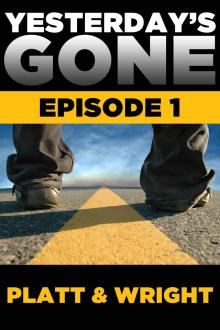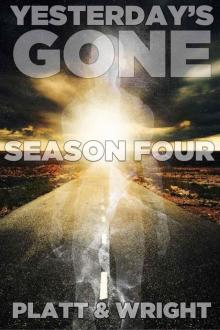- Home
- Sean Platt
Yesterday's Gone (Season Four): Episodes 19-24
Yesterday's Gone (Season Four): Episodes 19-24 Read online
Contents
Copyright
::EPISODE 19::
PROLOGUE — Eva Flores
CHAPTER 1 — Michael Blackmore
CHAPTER 2 — Boricio Wolfe
CHAPTER 3 — Brent Foster
CHAPTER 4 — Luca Harding
CHAPTER 5 — Mary Olson
CHAPTER 6 — Sullivan
CHAPTER 7 — Luca Harding
CHAPTER 8 — Marina Harmon
EPILOGUE
::EPISODE 20::
PROLOGUE — Will Bishop
CHAPTER 1 — Brent Foster
CHAPTER 2— Ed Keenan
CHAPTER 3 — Rose McCallister
CHAPTER 4 — Boricio Wolfe
CHAPTER 5 — Steven Warner
CHAPTER 6 — Paola Olson
CHAPTER 7 — Mary Olson
EPILOGUE — Roman Rosetti
::EPISODE 21::
PROLOGUE — Marina Harmon
CHAPTER 1 — Dan Konig
CHAPTER 2 — Mary Olson
CHAPTER 3 — Boricio Wolfe
CHAPTER 4 — Steven Warner
CHAPTER 5 — Brent Foster
CHAPTER 6 — Michael Blackmore
CHAPTER 7 — Boricio Wolfe
CHAPTER 8 — Brent Foster
CHAPTER 9 — Sullivan
EPILOGUE
::EPISODE 22::
CHAPTER 1 — Boricio Wolfe
CHAPTER 2 — Luca Harding
CHAPTER 3 — Michael Blackmore
CHAPTER 4 — Mary Olson
CHAPTER 6 — Luca Harding
CHAPTER 7 — Paola Olson
CHAPTER 8 — Luca Harding
CHAPTER 9 — Michael Blackmore
::EPISODE 23::
CHAPTER 1 — Edward Keenan
CHAPTER 2 — Brent Foster
CHAPTER 3 — Mary Olson
CHAPTER 4 — Boricio Wolfe
CHAPTER 5 — Brent Foster
CHAPTER 6 — Marina Harmon
CHAPTER 7 — Luca Harding
CHAPTER 8 — Boricio Wolfe
::EPISODE 24::
CHAPTER 1 — Luca Harding
CHAPTER 2 — Edward Keenan
CHAPTER 3 — Steven Warner
CHAPTER 4 — Mary Olson
CHAPTER 5 — Paola Olson
CHAPTER 6 — Edward Keenan
CHAPTER 7 — Rose McCallister
CHAPTER 8 — Edward Keenan
CHAPTER 9 — Rose McCallister
CHAPTER 10 — Boricio Wolfe
CHAPTER 11 — Sullivan
CHAPTER 12 — Edward Keenan
CHAPTER 13 — Mary Olson
CHAPTER 14 — Marina Harmon
EPILOGUE
Authors’ Note
Join The Goners
About the Authors
The Most Important Thing You Can Do To Spread the Word
Our Books
YESTERDAY’S GONE
SEASON FOUR
Copyright © 2013 by Sean Platt & David Wright. All rights reserved
Cover copyright © 2013 by David W. Wright
Edited by: Jason Whited jason-whited.com
Email at: [email protected]
This is a work of fiction. Any resemblance to actual persons living or dead, businesses, events, or locales is purely coincidental. The authors have taken great liberties with locales including the creation of fictional towns.
Reproduction in whole or part of this publication without express written consent is strictly prohibited.
The authors greatly appreciate you taking the time to read our work. Please consider leaving a review wherever you bought the book, or telling your friends or blog readers about Yesterday’s Gone, to help us spread the word.
Thank you for supporting our work. You rock!
Published by Collective Inkwell
Visit: CollectiveInkwell.Com
eBook Edition - August 13, 2013
Layout and design by Collective Inkwell
CollectiveInkwell.Com
* * * *
YESTERDAY’S GONE
::EPISODE 19::
(FIRST EPISODE OF SEASON FOUR)
“The Darkness Is Coming”
* * * *
PROLOGUE — Eva Flores
Duncanville, Ohio
September 2013
Eva fastened her 1-year-old daughter into the jogging stroller, kissed Maria on the forehead, and looked up to see the other mothers in the Mommy and Me Pound the Pounds group waiting at the head of the jogging trail that wound through their neighborhood park.
It was a beautiful day, the sun still low in the sky and not yet blazing as it had been through most of summer. A cool breeze blew through the park’s many elms and buckeyes, blowing Eva’s long, dark hair into her eyes. She stopped for a moment, grabbed a purple scrunchie from her wrist, pulled her hair back, then wrapped it in a loose ponytail as she continued toward the path.
“Hey, sorry I’m late,” Eva said as she met the group: 12 women and their children, most with one, except the blonde mom with twin boys. The mothers all stood waiting behind jogging strollers similar to hers, except for Ellen, whose daughter, Bianca, was now 4, and old enough to ride along on her Barbie bicycle.
“Hi, Ellen,” Eva said, as the little redhead met her with a giant smile.
Ellen leaned toward the stroller and smiled at Maria. “Aw, she looks so cute in that shirt.” The shirt, a light-blue tee, sporting the Octonauts characters from Maria’s favorite show.
“Thanks,” Eva said. “Her grandma bought it for her birthday.”
“OK, ladies, are we ready?” Kensie asked.
Kensie, a cute blonde (as short as she was perky) who looked like a former cheer captain, was the group’s leader and founder. When they first met, Eva thought she was a superficial bitch. After a year of knowing her, she still did.
Kensie started running, and the rest of the mothers fell in line behind her. Eva’s best friend in the group, Lacy, ran up beside Eva, then held her pace as Robbie, her 2-year-old son, babbled from his seat in the stroller.
“Are we better today?” Lacy asked, smiling at Eva.
Eva had been feeling blue for a while and couldn’t shake it. It started when Tom’s ridiculous schedule started sucking the blood from their lives. She put up with the hours in med school, then again through the hell of his internship, but it was supposed to stop. He promised it would. Yet, after Maria was born things had gotten even worse. Eva knew she wouldn’t have the house, or the car, or anything else without the endless hours it took for Tom to earn them, but what good was having all these things when she felt alone more often than not?
She might have been OK with his schedule if Tom would let her get a job. It wasn’t that he forbade it. He wasn’t a misogynist. But he said they didn’t need the money, so why stick Maria in a daycare or with some nanny? He even cited studies he’d read saying how children who spend time with their mothers were better adjusted, smarter, and all the other good things you wanted for your kids. Never mind that she’d read studies that showed that kids in daycare were often smarter and more sociable entering kindergarten.
Each time they got into the argument, she found herself feeling guilty, like a bad mother for wanting to get away from her child, for just a little each day. Guilt to the boredom: wet cement on broken ankles.
Running kept it from drying.
Eva didn’t need to pound an ounce from her body. If anything, her athletic frame could stand to gain a few. Her house had a small workout room, and she used it every day. Her muscle memory was fantastic, and the baby weight had practically melted from her body after Maria was born. The t
wice-weekly runs gave Eva the chance to bond with some of the other neighborhood women. Problem was, half the time Eva had no idea why she did it. She found most of the women boring, if not altogether insipid, except for Lacy, Donna, and Carol. Samantha, too, but only sometimes. These late-morning runs, despite the quality of their company, helped Eva feel human again, though the feeling was fleeting if it showed up at all. She considered it a sad commentary on her life that running with women she barely cared about was one of the highlights of every week.
Eva loved nearly every moment she shared with Maria. Her daughter was the sweetest, most angelic face Eva had ever known. But Maria was only a baby, and did little to answer her mommy’s ambition. She longed for conversation, it didn’t even have to be especially deep or meaningful. Eva would settle for anything that helped her feel more alive than merely there.
“So, are we feeling any better?” Lacy tried again.
“Sorry,” Eva said, wondering how long her mind had been wandering on her problems. She laughed, feeling awkward. “I’m not sure where my head is. I’m better, I guess. Just tired.”
Eva smiled at Lacy, then fixed her eyes to the road, hoping Lacy would be content to run quietly beside her. Usually hungry for conversation, there was enough happening in Eva’s head to make her hungry for quiet. Maybe she’d feel more like opening up after the first lap around the path, when the group started to scatter into smaller groups as they tended to do. Now she craved silence.
Lacy smiled back, silent, holding her pace beside Eva.
A few weeks back, Eva had stumbled into the first truly awful flare-up from her growing depression. There had been flickers before, but nothing like that night. It was horrible. Maria had been a terrific sleeper, ever since a few weeks into her infancy, but one night she started screaming, and then kept screaming with what sounded like night terrors for three evenings straight. Tom was clocking even more hours than usual, and Eva’s mother was being an absolute bitch, calling her and running Eva through a ringer of guilt over everything she expected and a few things Eva never saw coming. None of it was particularly catastrophic or even unusual, but somehow the sum total of everything seemed to rattle Eva from the insides. Without warning, she woke on that fourth morning and found it physically painful to get out of bed. Tom left for work, and Eva cried for hours. Maria cried in the crib beside her.
Eva cried while changing her daughter, cried while feeding her, and cried while lying down for their afternoon nap. She cried while drinking her morning coffee, and cried during lunch. She cried while filling her cart at Whole Foods, then again while checking out. There was no sobbing or heaving or nose blowing, only an endless stream of tears that seemed to flow from a busted spigot from early dawn to the ugly shadows of dusk.
She couldn’t say anything to Tom, of course, and while Eva would have gladly confessed her every feeling to Maria, and did, her baby daughter could do nothing to help.
Eva’s boredom, the sentence served for being a stay-at-home mom, was slowly fermenting into resentment. Being at home was never what she wanted; it was a product of Tom’s insistence. A few years before, Eva had been looking toward a future dappled with the blooming fruits of her ambition. She wanted to be an actuary. Certainly not the coolest job in the world, as Tom often reminded her, saying it sounded almost as exciting as cardboard, but Eva was, and had always been, fascinated by risk and uncertainty. To her, being an actuary sounded fun; she would provide assessments of financial security systems, evaluating the probability of events to quantify outcomes so her clients could minimize the losses associated with uncertain undesirable events. OK, boring as cardboard, but her brain would be busy, and it was certainly better than losing years as a maid, chauffeur, short-order cook, and dishwasher.
“So,” Lacy asked, after the near silence of clomping Nikes was finally too much. “How was last week’s doctor’s visit?”
“They tried putting me back on the happy pills,” Eva shrugged, “but I said no thanks.”
“There’s really no shame in taking antidepressants,” Lacy said. “Hell, all the moms are either on them, or have been.”
“Yeah, I did them for a bit after Maria was born. Had postpartum depression, and Tom convinced me it was best.”
“And?” Lacy said, “They helped?”
“Yeah, at first, but after a while I felt like a zombie. I hated it. Besides, it’s normal to be down every now and then, right? That’s what’s wrong with people today,” Eva lowered her voice to keep from offending the group, “everyone thinks they have to be happy 24/7. I shouldn’t have even gone back to the doc. All he wants to do is put me on pills.”
“So,” Lacy said, her voice low, “are you OK? Have you considered … therapy?”
“Yeah, yeah, I’m fine,” Eva said. “And no thanks on the therapy. Been there and done that, too. They want to put me on meds, no different from the other doctors. A big no thanks to that; you guys are my therapy, just getting out of the house and being with adults, you know?”
“Yeah,” Lacy said. “Hey, you should come to the cookie swap this Saturday. It should be fun. Supposedly, Deb’s going to make those brownies we’re not supposed to talk about.”
“Yeah?” Eva felt herself wince. “Who’s going?”
“Almost everyone? Didn’t you get an e-mail?”
Eva frowned, “No, I didn’t.” She looked at Kensie, and felt a sudden flush of anger.
Why didn’t they e-mail me?
This wasn’t the first time the group had overlooked sending an invitation to Eva. There was a dinner a few weeks ago that she found out about only three days later. She looked around at the other women, and could feel them thinking she wasn’t good enough to be with them — as if she was the boring one. There had been five or six times (depending on how she was counting) in the past three months when Eva had been left out of something. Each time, Lacy managed to bring it up, making Eva feel like shit. She wondered if it was some sort of passive-aggressive thing and that Lacy was purposely telling Eva so she felt excluded. So she felt like a lesser.
Lacy asked, “You OK?”
Eva snapped, “Why are you so damned concerned about whether I’m OK all the time?”
Lacy looked at Eva as if slapped. “What?”
“You know what!” Eva said, running faster, wanting to flee one of her few friends before she said something worse, or something that she couldn’t take back. Like last night with Tom, Eva could feel her temper threatening to spill, and knew it would be even worse than it had been with Tom, yet she could do nothing to stop it.
Maria started crying. Eva ran even faster, but still Lacy caught up.
“Hey, did I do something to piss you off?”
Eva said nothing, her mind bubbling from emotions she didn’t understand. She felt as if all the women were staring at or right through her. Someone up ahead laughed, but Eva didn’t see who. Probably that bitch Kensie.
“Hello, Earth to Eva?” Lacy said, her voice suddenly like a handful of broken glass.
“What?” Eva replied, stopping with a sudden halt.
While the world around them suddenly seemed to freeze, with all eyes from the other mothers on them, Eva felt a building pressure in her brain, and a shortness of breath. It felt like a panic attack times one hundred.
Maria screamed, though Eva couldn’t focus on her now. She was feeling a strong desire to run — run far away. Don’t look back, just go, leave everything behind.
“What’s your problem?” Lacy asked.
Eva’s hands trembled as she forced them down at her sides, trying to shutter her sudden urge to swing at Lacy. She’d never hit anyone before, and didn’t know from where her feelings were stemming. She was claustrophobic, as if the bitches were closing in: pointing, whispering, laughing.
Eva’s right hand slipped into her right pocket as if working independently from her brain, finger curled around her house key, only peripherally aware of the movement.
“Maybe you should go on pills,
Eva! You’re acting like a nut,” Lacy said, then turned and jogged ahead.
Eva stood, shaking. Then, before she knew what she was doing, she lunged forward. Movement without thought flung her toward Lacy. Eva’s hands flew into the air with the key like a sword sticking out from her fist.
Lacy turned, eyes wide in shock before Eva’s key found her left eye socket, then twisted the key to unlock an eruption of blood.
Lacy’s screams were echoed by the women around them, but Eva barely noticed as she flipped Lacy over and dragged her from grass to asphalt path, and smashed her face hard into the ground, repeatedly, rending her skull into chunks of bone and meat.
Lacy’s son, still in his stroller, screamed for his mother. Somewhere in the din, Eva heard her daughter, also crying out. But the pressure in her head swelled, and she had to find relief. Had to stop it.
Eva turned, eyes narrowing on the 3-year-old boy, strapped tight into his stroller, unable to escape, “Shut up, shut up, shut up!”
She leapt onto the stroller, her open mouth tearing at the child’s neck. Warm blood flooded her mouth, animal adrenaline shot through her body.
The child’s screams were like fuel to the fire in her head. She had to silence them. She arched down to bite again, but as she moved forward, something stopped her.
Hands were on her, pulling her from the child.
Eva fought back: tearing, biting, painting the mommies in blood before some of the women managed to wrestle her to the ground.
“Get off of me!” she screamed, desperate, thrashing, and lashing out.
She had to get up, had to get away, had to silence the screaming children.
Had to …
And then something hit her in the head, hard, stopping the chaos, and slowing things down.
She relaxed, feeling a dizziness overwhelm her. It was almost intoxicating in its promise to silence the din.
As Eva’s vision clouded with smudges of darkness, all she saw was her baby girl, crying and reaching out for her.
* * * *
CHAPTER 1 — Michael Blackmore

 Jumper: Books 1-6: Complete Saga
Jumper: Books 1-6: Complete Saga WhiteSpace Season One (Episodes 1-6)
WhiteSpace Season One (Episodes 1-6) Tomorrow's Gone Season 1
Tomorrow's Gone Season 1 Yesterday's Gone: Episode 1
Yesterday's Gone: Episode 1 Yesterday's Gone: Seasons 1-6 Complete Saga
Yesterday's Gone: Seasons 1-6 Complete Saga The Beam- The Complete Series
The Beam- The Complete Series The Tomorrow Gene
The Tomorrow Gene Karma Police: Karma Police Book Two
Karma Police: Karma Police Book Two The Fall (Karma Police Book 5)
The Fall (Karma Police Book 5) The Beam: Season Three
The Beam: Season Three Resurrection
Resurrection No Escape (No Justice Book 2)
No Escape (No Justice Book 2) Deviant (Karma Police Book 4)
Deviant (Karma Police Book 4) The Tomorrow Clone (The Tomorrow Gene Book 3)
The Tomorrow Clone (The Tomorrow Gene Book 3) Unicorn Western
Unicorn Western Namaste
Namaste Alien Invasion (Book 2): Contact
Alien Invasion (Book 2): Contact Alien Invasion (Book 4): Annihilation
Alien Invasion (Book 4): Annihilation Dead City
Dead City The Eden Experiment
The Eden Experiment Unicorn Genesis (Unicorn Western)
Unicorn Genesis (Unicorn Western) The Beam: Season Two
The Beam: Season Two Yesterday's Gone: Season Six
Yesterday's Gone: Season Six Homecoming (Karma Police Book 6)
Homecoming (Karma Police Book 6)![[Alien Invasion 01.0] Invasion Read online](http://i1.bookreadfree.com/i1/03/30/alien_invasion_01_0_invasion_preview.jpg) [Alien Invasion 01.0] Invasion
[Alien Invasion 01.0] Invasion Z 2136 (Z 2134 Series Book 3)
Z 2136 (Z 2134 Series Book 3) Alien Invasion (Book 5): Judgment
Alien Invasion (Book 5): Judgment Threshold
Threshold Judgment
Judgment Jumper: Karma Police Book One
Jumper: Karma Police Book One Boricio Goes Camping (Dark Crossings)
Boricio Goes Camping (Dark Crossings) Extinction
Extinction Yesterday's Gone (Season Four): Episodes 19-24
Yesterday's Gone (Season Four): Episodes 19-24![[No Justice 01.0] No Justice Read online](http://i1.bookreadfree.com/i2/04/09/no_justice_01_0_no_justice_preview.jpg) [No Justice 01.0] No Justice
[No Justice 01.0] No Justice The Beam: Season One
The Beam: Season One La Fleur de Blanc
La Fleur de Blanc The Collectors (Karma Police Book 3)
The Collectors (Karma Police Book 3) WhiteSpace: Season One (Episodes 1-6 of the sci-fi horror serial)
WhiteSpace: Season One (Episodes 1-6 of the sci-fi horror serial)